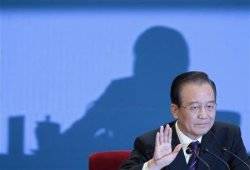China could see a repeat of the deadly chaos of the country's so-called 'Cultural Revolution' without urgent political reform, Wen Jiabao has warned in a dramatic parting shot at his final news conference as premier.
Wen is widely considered the most progressive of China's leaders, but analysts said his comments on Wednesday, at the closing of the annual parliamentary session, were his strongest call yet for political reform within the one-party state.
"We must press ahead with both economic structural reform and political structural reform, in particular reform in the leadership system of our party and country," he told reporters, calling the process an "urgent task".
"Without a successful political structural reform, it is impossible for us to fully institute economic structural reform and the gains we have made in this area may be lost," he said.
"Such historical tragedy as the Cultural Revolution may happen again."
The 1966-1976 Cultural Revolution was a decade of brutal chaos launched by revolutionary leader Mao Zedong to bring down what he perceived as "capitalist" forces.
Untold numbers died in the turmoil as students turned on teachers and officials were purged, and memories of the period still haunt many older Chinese.
"I know very well that the reform will not be an easy one. The reform will not be able to succeed without the consciousness, the support, the enthusiasm and creativity of our people," Wen added.
Law approved
Wen's comments came after China's parliament approved revisions to a key criminal law that, at least on paper, will restrict police powers to secretly detain people, a tactic which human rights campaigners say is increasingly used against activists and government critics.
Speaking after the closing of the session, Zhang Jianxin, a Zhejiang provincial delegate said the new version of the law was more reflective of society.
"I think big amendments have been made to the original criminal procedure law, these amendments relate better to our Chinese actuality," he said.
The bill, which comes into effect in 2013, was passed overwhelmingly with 2,639 delegates voting for it, and just 160 against.
"It is an overhaul of China's criminal procedure law after 15 or 16 years of no changes, so it is going to be quite a major thing," Al Jazeera's Melissa Chan reported from Beijing.
"There has been a lot of controversy about it, but of course some of the positive things to come out of this new legislation is the fact that suspects will now have access to a lawyer immediately ... and there are other basic things that you would consider quite necessary to put in the rulebooks concerning the detention of suspects and the arrest of suspects."
Enforcement
While legal reformers have mostly applauded the revisions, saying they will offer better protection of suspects and reflect increasing awareness in China of the need for stronger detainee rights, legal enforcement in China is another matter.
Police and prosecutors routinely ignore current legal provisions protecting suspects' rights and have frequently used charges of endangering national security against dissidents, according to human rights campaigners.
Authorities are also alleged to have used the tactic of extra-legally "disappearing" people for months at a time, detaining them in so called black jails and not informing their families.
There are two relevant articles in the new law that deal with notifying families, one in regular criminal cases and the other involving a type of detention known as residential surveillance.
Both have been revised to better protect detainees, though they do not do away completely with secret detentions, scholars said.
In the case of residential surveillance, a sort of house arrest that can happen in a fixed location that is chosen by police, a detainee's family must be notified within 24 hours unless they cannot be reached.
Dissidents detained under this kind of residential surveillance are often put in suburban hotels or apartments, and many have reported being tortured by police.
"At this point it is quite difficult to see what the enforcement of [the new law] will be in terms of preventing secret detentions in China," Al Jazeera's Chan said.
This year's 10-day congress was held not only amid economic concerns but a challenging leadership transition as President Hu Jintao and the most senior Communist Party leaders begin stepping aside in October, after a decade in
power, to make way for a younger generation.
PHOTO CAPTION
China's Premier Wen Jiabao gestures as he delivers a speech at a news conference after the closing ceremony of the National People's Congress (NPC) at the Great Hall of the People in Beijing March 14, 2012.
Aljazeera


 Home
Home Discover Islam
Discover Islam Quran Recitations
Quran Recitations Lectures
Lectures
 Fatwa
Fatwa Articles
Articles Fiqh
Fiqh E-Books
E-Books Boys & Girls
Boys & Girls  Ramadan
Ramadan Fatwa Audios
Fatwa Audios Month of Mercy
Month of Mercy Women
Women Eed Al- Fitr
Eed Al- Fitr Food Recipes
Food Recipes Videos
Videos

 Prayer Times
Prayer Times












